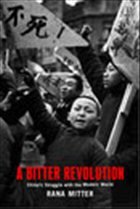Key Features:A complete reassessment of twentieth-century Chinese history
- Exciting account of how the politics and culture of China changed forever during the twentieth century
- Deals with China's 'hidden history', e.g. China and Japan were not always enemies, and Communism was not inevitably destined to succeed in China
- Media-friendly author: documentaries on History Channel (The Samurai and the Swastika, Kublai Khan in June 2004), Nightwaves on Radio 3, the BBC World Service
Description:
China is now poised to take a key role on the world stage, but in the early twentieth century the situation could not have been more different. Rana Mitter goes back to this pivotal moment in Chinese history to uncover the origins of the painful transition from a premodern past into a modern world.
By the 1920s the seemingly civilized world shaped over the last two thousand years by the legacy of the great philosopher Confucius was falling apart in the face of western imperialism and internal warfare. Mitter takes us through the resulting social turmoil and political promise, the devastating war against Japan in the 1940s, Communism and the Cultural Revolution of the 1960s, and the new era of hope in the 1980s ended by the Tian'anmen uprising. He reveals the impetus behind the dramatic changes in Chinese culture and politics as being China's "New Culture" - a strain of thought which celebrated youth, individualism, and the heady mixture of strange and seductive new cultures from places as far apart as America, India, and Japan.
Contents
Prologue
Tian'anmen Square, 1989
1 Flashpoint - Beijing, May Fourth, 1919
2 Saving the Nation: the era of the May Fourth Movement
3 Erasing the past: iconoclasm and the destruction of tradition
4 Ugly Chinamen and Dead Rivers
5 Making a stand: the lure and limits of democracy
Epilogue
The Legacy of May Fourth
- Exciting account of how the politics and culture of China changed forever during the twentieth century
- Deals with China's 'hidden history', e.g. China and Japan were not always enemies, and Communism was not inevitably destined to succeed in China
- Media-friendly author: documentaries on History Channel (The Samurai and the Swastika, Kublai Khan in June 2004), Nightwaves on Radio 3, the BBC World Service
Description:
China is now poised to take a key role on the world stage, but in the early twentieth century the situation could not have been more different. Rana Mitter goes back to this pivotal moment in Chinese history to uncover the origins of the painful transition from a premodern past into a modern world.
By the 1920s the seemingly civilized world shaped over the last two thousand years by the legacy of the great philosopher Confucius was falling apart in the face of western imperialism and internal warfare. Mitter takes us through the resulting social turmoil and political promise, the devastating war against Japan in the 1940s, Communism and the Cultural Revolution of the 1960s, and the new era of hope in the 1980s ended by the Tian'anmen uprising. He reveals the impetus behind the dramatic changes in Chinese culture and politics as being China's "New Culture" - a strain of thought which celebrated youth, individualism, and the heady mixture of strange and seductive new cultures from places as far apart as America, India, and Japan.
Contents
Prologue
Tian'anmen Square, 1989
1 Flashpoint - Beijing, May Fourth, 1919
2 Saving the Nation: the era of the May Fourth Movement
3 Erasing the past: iconoclasm and the destruction of tradition
4 Ugly Chinamen and Dead Rivers
5 Making a stand: the lure and limits of democracy
Epilogue
The Legacy of May Fourth

